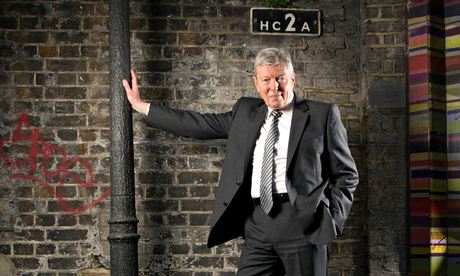
Sometimes, when someone wins a prize, you want to cheer. You might have wanted to cheer twice last week. The reason to cheer – when things were happening in elections which didn't make you want to cheer – was that a very nice, very bright man who also happened to be a politician had proved to the world that he was a very good writer indeed.
In the past week, Alan Johnson has won the Orwell prize and the Ondaatje prize for his memoirabout his childhood, This Boy. The Orwell prize is for books and journalism that "make political writing into an art". The Ondaatje prize is for the book that "best evokes the spirit of a place".
In This Boy, Alan Johnson does both. He makes you smell and see the streets of his Notting Hill childhood. He makes you feel the cold on a winter's night and taste the pie and mash. He also writes in the way that Orwell thought you should write: in language that's clear and true. Writers, said Orwell, should avoid cliches, jargon and "pretentious Latinised style" because "language can corrupt thought".
It's quite hard to imagine Alan Johnson ever using a "pretentious Latinised style". It's certainly hard to imagine him talking about things like "predistribution". This, after all, was the man who said, when he was made shadow chancellor, that he'd have to "pick up a primer of economics for beginners". He didn't mean he wasn't up to the job. Of course the man who had been home secretary was up to the job. When he talked about the "economics primer", he was just being himself: modest, warm and quite keen on something that used to be called a joke.
What you find when you read the book is a boy who falls in love with books, and music, and poetry, even though there was very little of any of it around. You find a boy who didn't think "cost of living" was a slogan, but something that meant you didn't eat.
What you don't find is a boy who grew up thinking that he'd quite like to be prime minister, and who thought that the best way to do that was probably by becoming a special adviser to a politician, but first going to Oxford and reading PPE.
This Boy makes you think it would be nice if the people who represented you had actually done a few things before they went into politics. It reminds you that youth and energy are lovely, of course, but that there's also something to be said for people who have been around. It makes you think that if Labour had a leader like Alan Johnson – if Labour had, in fact, a leader who was Alan Johnson – then next year's election might be a very different thing.
But the book also reminds you of a world that has gone. Alan Johnson grew up in houses shared with other families, with no electricity, no heating, no bathroom, no toilet, no washing machine, no phone and no fridge. The family's one luxury, a "wireless", was rented. His childhood, he says, was spent in "an almost permanent state of hunger". If his mother hadn't done the cleaning jobs that probably killed her, he and his sister would barely have eaten at all.
Hardly anyone in this country lives like that now. Hardly anyone has to share their home with other families. Hardly anyone has to use an outdoor loo. Most people now have heating, and fridges, and TVs, and phones. Most people – 83% of households, in fact – have internet access. Quite a few people think having a TV, computer and smartphone is a right.
If this isn't progress, I don't know what you'd call it. And this has happened because of politics. It's politics that has meant that people on low incomes don't share homes with other families, politics that has given people tax credits, income support and free school meals. Certainly, some people are struggling. Many of us will struggle, in this new globalised, digitised economy, to have the standards of living we had before. But even our new, lower standards of living are standards most people in the world would kill to have.
If people want to protest in elections, that's their democratic right. Most of us want more than we have. Politicians have encouraged us to expect that we'll get more than we have. Perhaps they shouldn't. Perhaps we shouldn't. Perhaps we should follow the rule that Alan Johnson's mother gave him, and which he quotes in his beautiful book. What she told her children, who were often cold and often didn't eat, was that they should "be polite and courteous and help those less fortunate than ourselves".
Twitter: @queenchristina_

